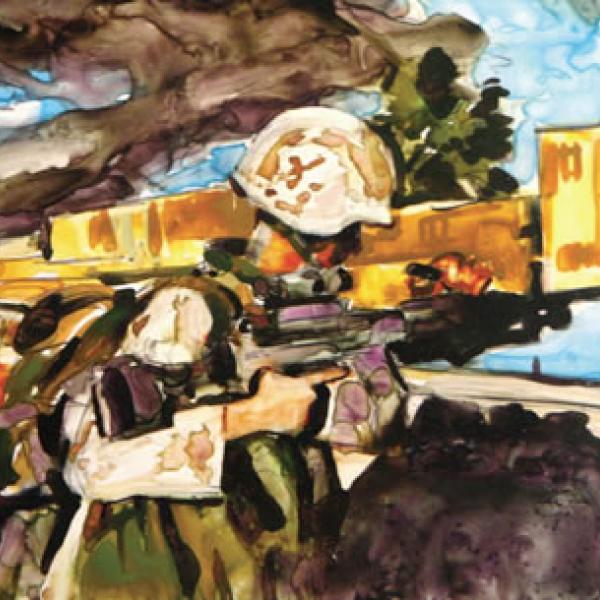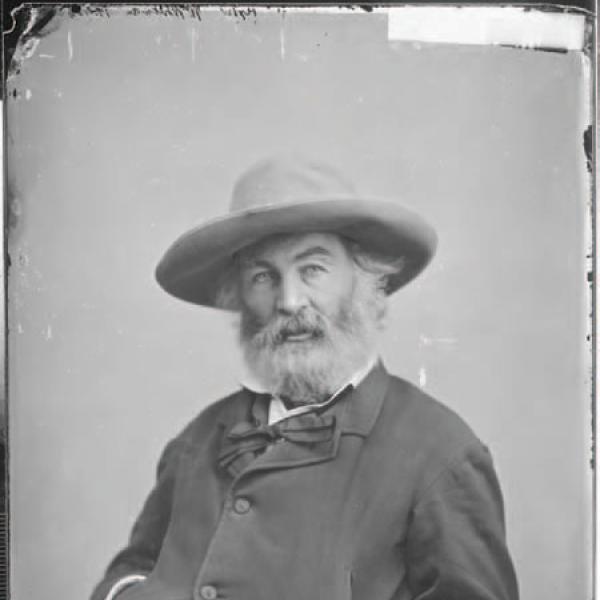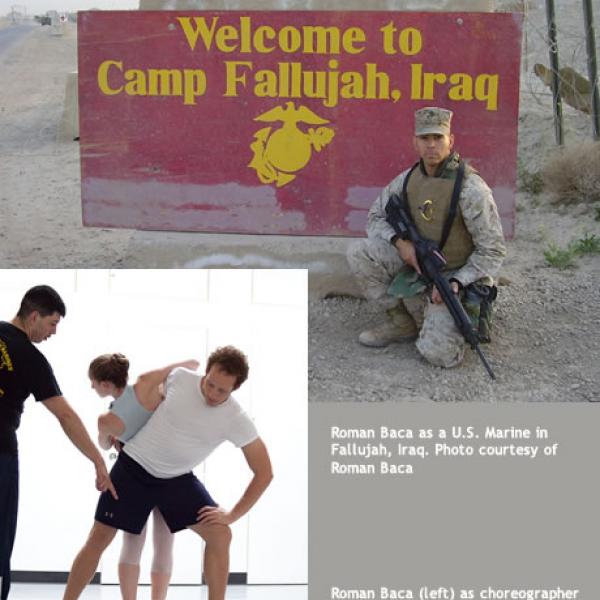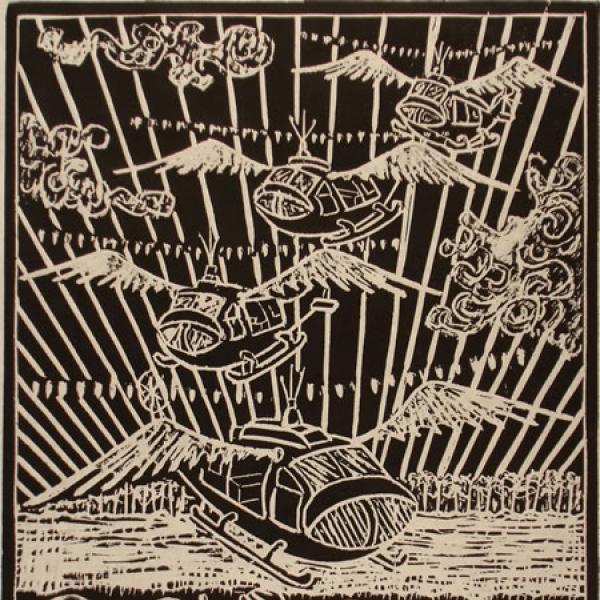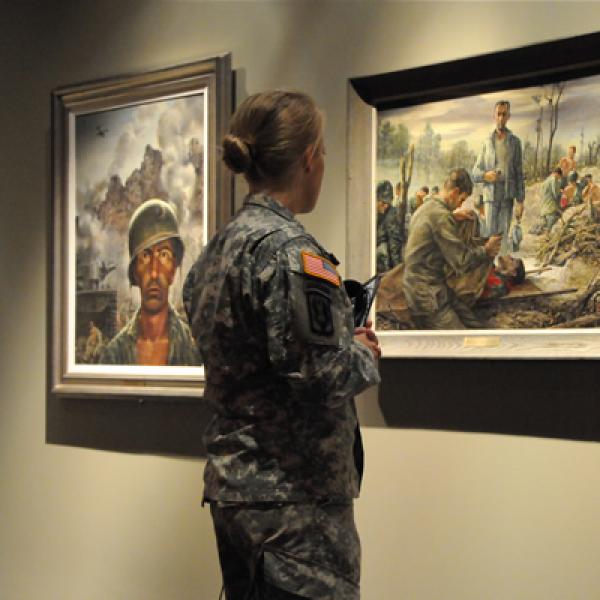Theater of War
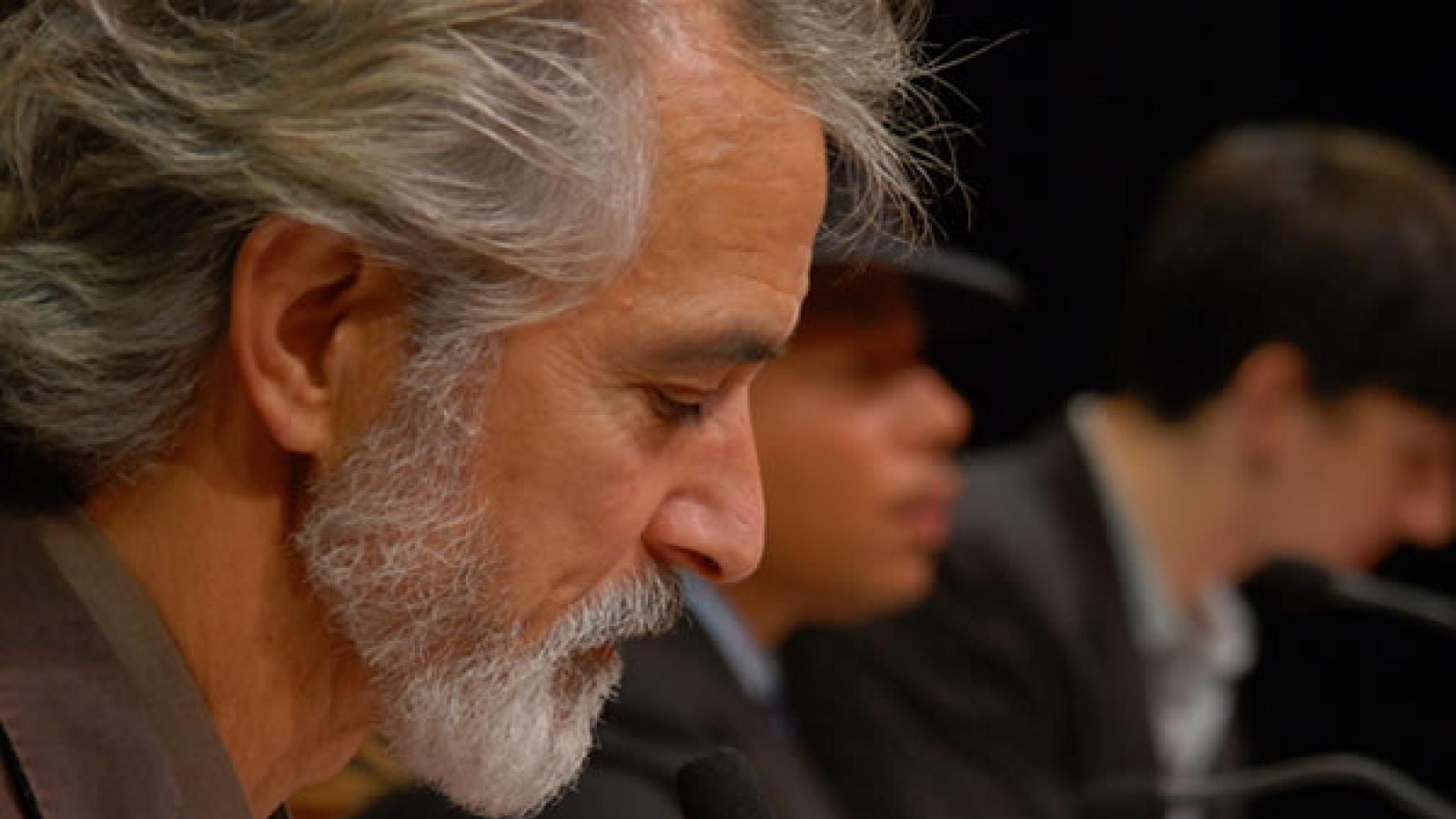
David Strathairn in Theater of War. Photo by Paxton Winters
A classicist and translator, Bryan Doerries believed that the ancient military tragedies of Sophocles, who was a general as well as a playwright, would speak to the experiences of today’s service members and provide an avenue for them to share their own stories. The result, Theater of War, has been a success beyond anyone’s expectations. (running time: 15:42)

Bryan Doerries, director of Theater of War. Photo by Howard Korn
Jo Reed Welcome to NEA Arts online. I'm Josephine Reed. In the current issue of NEA Arts, we examine the long and rich connection between the arts and the military.
Philoctetes: I am Philoctetes, keeper of Heracles’ bow. Whom the generals and Odysseus abandoned. Suffering from a snake bite, they left me here, to die in tattered rags, sleeping in a cave, starving without much food to eat. I only wish the same for them.
Jo Reed: That was actor David Straithairn performing in Philoctetes by Sophocles. Philoctetes was a Greek warrior who at the beginning of the Trojan War was bitten by a snake and abandoned by his own army, on an island halfway between Greece and Troy. He lives there for nine years, waiting for the Greeks to return to bring him home. It's one of the plays performed for active service members by Theater of War.
Bryan Doerries: Theater of War is an innovative public health project that presents readings of Sophocles' ancient Greek tragedies about war; in particular a play called Ajax and Philoctetes to service members and veterans as a catalyst for conversations about timeless issues that service members face today, such as PTSD, suicide, and the impact of war on families and communities.
Jo Reed: Theater of War is the brainchild of director and translator Bryan Doerries.
Bryan Doerries: I studied classics in college and always believed that these ancient plays that I was studying had a larger audience to reach than the ivory tower. In the 2006/2007 range when the first real wave of reports of service members and veterans returning from the wars in Iraq and Afghanistan were beginning to hit the front pages of papers, stories like the Walter Reed scandal in which many of our veterans were not receiving the medical care they needed, or stories of homicides, or suicides, or domestic violence, killing sprees, stories of depression, and the ugly pollution that comes back from any war, when I started to read these in the newspaper I began to hear echoes and see lines in the stories that seemed like they could be ripped from Sophocles' plays, and that's where I started to get the idea. I thought, if I can put my translations of ancient Greek plays in front of military audiences, something might be unlocked in the plays, and something might be unlocked by the plays in the audiences.
Jo Reed: Of course, it's one thing being convinced that performing Sophocles for active duty service members would have an emotional resonance for them, and it's quite another to persuade the military of that.
Bryan Doerries: I spent about a year knocking on doors, in ignorance, not really knowing how to go about finding a military audience, calling people, writing letters, sending emails. Most of the doors were politely shut in my face, a few were slammed. And almost a year out I was beginning to give up hope.
Jo Reed: But then Bryan Doerries found the opportunity he had been looking for.
Bryan Doerries: I was reading the New York Times in January of 2008, a series of front-page Sunday articles that were featuring and describing the invisible wounds of war and the onset of violence and suicide that was returning to our shores from the conflicts in Iraq and Afghanistan. And in that article in the New York Times there was a quote by a Navy psychiatrist named Captain William P. Nash who was the head of combat operational stress control for the Marine Corp in 2008. And the quote was something like "I begin all of my presentations on combat stress and PTSD with the ancient story of 'Ajax'." There it was in bright lights. I knew if I'd track down William P. Nash, Captain Nash, I might find my audience.
Jo Reed: Doerries reached out to Captain Nash, who invited him out to San Diego to present Sophocles’ plays at a conference for five hundred Marines on combat stress or PTSD. It was Theater of War’s first performance, and it would become a template for all the performances that followed. First, it’s a bare-bones production.
Bryan Doerries: There's a table with four or five chairs, four or five actors in their street clothes. The actors are reading from scripts. It's just a reading. But of course, our readings are like readings on steroids. The actors are fully committing emotionally. They're attacking the text.
Ajax: Dishonored in front of my fellow soldiers! This much I know: if Achilles still lived and decided to hold a contest for his arms, awarding them to the greatest warrior at the end of the day, they would be mine!
Jo Reed: Then comes the heart of the evening. The reading is then followed by a town hall discussion generated from the issues raised by the plays.
Bryan Doerries: The first time we scheduled one of these performances, we scheduled the town hall discussion to last 45 minutes, and it lasted several hours and had to be cut off near midnight. And at one point I remember looking out into the audience and seeing 40 to 50 people lined up to come up to the microphone, and each person who came up this first time spoke unbelievably well, and almost like perfectly rhetorically structured monologues in which they had always woven in or used a quote from the play as a point of departure for their comment, as if they'd known the plays their entire lives. They weren't looking at their notes. It seemed to cut across all rank, and people all felt empowered to speak the truth of their experience. And it was then that I knew that we had stumbled across something extremely powerful and ancient; perhaps something that in spite of the simplicity of the format of, you know, in which we performed these events, something we've lost touch with in our culture, which is the power of what theater can do. All of a sudden you look out in the audience and there are 500 Marines all sitting forward in their seats, doing what in the military is called locking on, which means staring without blinking for an hour. And there's something about live theater that is something alchemical, something neurological, something transcendent that erases and dissolves boundaries and hierarchies temporarily, something about theater that is extremely conducive to creating a safe space for people to respond in this human way.
Jo Reed: Doerries reminded me that Sophocles was not just a playwright, he was also a general, and he wrote his great military tragedies at a time that Athens had seen 80 years of war within one century. Doerries and other scholars believe that the plays were written to help those Greek citizen-soldiers heal from a seemingly unending state of war. Today's service members would agree with that assessment.
Bryan Doerries: This soldier came up to me and he said, "I didn't feel comfortable speaking during the discussion, but I wanted to tell you, Bryan, that I think Sophocles wrote these plays to restore humanity to individuals who for whatever series of reasons felt that they had lost it along the way.” And I think art has the potential and the capacity to help restore humanity, because almost reflexively involuntarily, it taps into something that reminds us that we are human.
Jo Reed: Theater of War also presents Sophocles’ other great military tragedy,Ajax. Ajax is a play that explores the cost of war paid by the soldier and his family. Ajax is a brave and decorated ancient Greek warrior who at the end of nine years of non-stop battle with Troy, comes home, loses his mind, and ultimately kills himself. It's also the story of his wife, Tecmessa, and his family, who try desperately to penetrate his madness.
Tecmessa: In the dead of night, when the lamps no longer burned, Ajax found his sword and moved to the door. Naturally, I objected. “Where are you going? No messengers come calling for help, all of the soldiers are asleep, please come back to bed.” He turned to me and firmly said, “Woman. Silence becomes a woman.” I’ve heard that before, and I know what it means, so I quit asking questions. And he left without saying a word. Whatever happened then, I cannot say.
Bryan Doerries: Service members and veterans and families see this play, they immediately know what it's about. With theater, and with ancient theater in particular, there’s also another great advantage, which is to say, with these audiences, where the stakes are career-ending in some instances to get up and say, "I have PTSD," or "I've been depressed," or "I've thought about suicide," or "My spouse has thought about suicide," to create an environment where people feel comfortable doing that—the ancient plays are really handy at that because one can watch Ajax and feel all the emotions of the play, and stand up during the town hall discussion and simply say, "I really related to the scene in which Ajax said, ‘The great man must live in honor, or die an honorable death.’ That- that really spoke to my core values.” Someone could also stand up and step out from behind the archetype and behind the metaphor and behind the character and say, "You know, I was really moved by that because I am Ajax."
Jo Reed: Bryan Doerries remembers well Theater of War’s first performance ofAjax.
Bryan Doerries: The first time we did it the first person to speak at that performance was a woman. And she stood up and she said, "Hello. I'm the proud mother of a Marine and the wife of a Navy Seal. And my husband went away four times to war just like Ajax. And each time he came back dragging invisible bodies into our house. And our home is a slaughterhouse, to quote from the play. The war came home with him.” And when someone does something like that, when a spouse gets up and speaks the truth of her experience, bears witness, it creates a space where other spouses feel comfortable doing the same. And some of them will talk about Tecmessa, Ajax's wife, and some of them will talk about themselves.
Jo Reed: During this period of time, the Department of Defense was addressing the need the break down the stigma unfortunately attached to PTSD, and it saw the potential Theater of War offered for opening important avenues of conversation. Theater of War went from military outsider to DoD collaborator.
Bryan Doerries: Shortly after that initial performance of Theater of War in 2008 someone said you should really talk to this general named Brigadier General Loree Sutton, who at the time was the founding director of the Defense Centers of Excellence for Psychological Health and Traumatic Brain Injury. And so we did a performance at a conference for the DoD later that year. And the conference was high-ranking officials, and many generals, and all the people in the corps deco community, they were coming together to address these issues. And that went extremely well, and that resulted in a series of conversations at the sort of highest levels of mental health within the military. Maybe a couple months after that I found myself sitting around a table with 15 or 20 people, high-ranking officers from every service. We even had someone from the NEA with us, Jon Peede, who had been to some of our performances. And we all sat around the table and rolled up our sleeves and said, "What would it mean to take this idea and take it to scale." By the end of the meeting we were talking about, "Well, what would it mean if we did 200 performances at 100 military bases or posts across the country?" We got a contract, and over a one-year period we did 100 performances, more than 100 performances at military sites throughout the country and the world. And we've now presented Theater of War, you know, 202 times. We've performed in the Pentagon. We performed in Japan. We performed in Guantanamo Bay, Cuba. We've performed in military sites throughout the U.S.
Jo Reed: Doerries realized he could take that same methodology of live theater and discussion and apply it to other social issues, which led to another project with the Department of Defense.
Bryan Doerries: We've been to a lot of military site where one of the core issues they also want to discuss in the community, aside from psychological injury and combat-related, combat stress is substance abuse, especially alcohol abuse. In response to that we developed a project called Rum and Vodka, which is a series of selections from Conor McPherson's play, Rum and Vodka, the Irish playwright. And it's about a 24-year old struggling with alcohol abuse, and who over the span of three days cheats on his wife, and loses his job, and drinks something like 53 pints. And we just came back from a trip to Kuwait and Qatar, where we performed for the Third Army, soldiers who were about to transition back to the United States after having been deployed for a year or more. And the idea behind performing at that time for those soldiers was to engage them before, as the general who brought us over there said, "they return to the land of the open bar."
Jo Reed: So, it turns out that Bryan Doerries’ intuition was correct after all: these plays, written over 2,500 years, did speak to today's service members. But what Doerries hadn't anticipated was that the experience of Theater of Warwould allow him to hear Sophocles with a soldier's ear.
Bryan Doerries: Everywhere I go, everywhere we perform, it’s just ceaselessly engaging and remarkable to hear these audiences respond to these ancient texts. And, you know, it was pretty early in the process where I realized that I translated the play from ancient Greek and I thought I knew what it was about, but, in fact, the play was written in a code that I as a civilian needed military audiences to translate for me.
That was Bryan Doerries, he's the creator, director and translator for Theater of War.
Theater of War is produced by Outside the Wire. For more information aboutTheater of War, go to outsidethewirellc.com
You've been listening to NEA Arts online. The current issue of the magazine is focused on arts and the military. You can check it out at arts.gov
Excerpts from Philoctetes performed by David Straithairn
Excepts from Ajax, performed by Bill Camp and Elizabeth Marvel
Both used courtesy of Theater of War
Excerpts from “Desolation” composed and performed by Todd Barton, used courtesy of Valley Productions
For NEA ARTS online, I'm Jo Reed. Thanks for listening.



